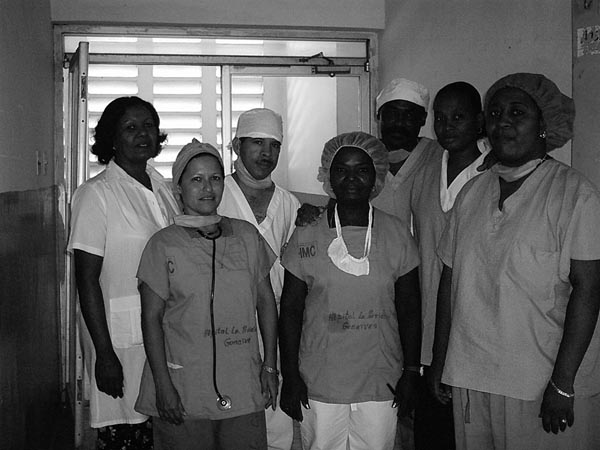The TUC has its own Aid for Haiti appeal. But where will the money go? The history of its involvement in South America does not bode well for the future…
Haiti puts the spotlight on the politics of aid
WORKERS, FEBRUARY 2010 ISSUE
The British working class are a generous lot when it comes to those who find themselves victims of terrible natural calamities or dreadful wars. Witness the outrage when the BBC alone decided not to screen the Disasters Emergency Committee’s (DEC) appeal for the people of Gaza. Witness as well, the magnificent response to the DEC appeal for the people of Haiti – with the Welsh and other fire fighters rescuing buried victims. But what of the TUC’s Aid for Haiti appeal? How does this fit in with the working class’s traditional generosity?
Well, the TUC will hand all the money collected to the International Trade Union Confederation (ITUC), formerly the International Confederation of Free Trade Unions (ICFTU). The post-war history of this organisation needs closer scrutiny.
The ICFTU broke away from the World Federation of Trade Unions in 1948 as a Cold War gesture led by the British TUC and the American AFL/CIO. There then followed a period when the ICFTU encouraged affiliates to ban communists and “fellow travellers” from holding office, even as shop stewards or on Trades Councils. In Britain, this policy held sway for more than twenty years.
Living with capitalism
The ICFTU tried to encourage the “opposition” in the socialist bloc and to undermine the WFTU whenever it could. It took as its own the West’s foreign policies and was happy to live with capitalism. It was in effect the creation of capitalism frightened by the growth of workers’ support for the USSR and socialism after WWII.
After the collapse of the USSR, the ICFTU turned its attention to Cuba, the island that was now struggling with an increased US blockade and the collapse of its former trading partners. Despite the fact that Cuban unions within the CTC which was affiliated to the WFTU had over 90 per cent membership density on a voluntary basis and manual subs collection, the ICFTU found a stooge or two who claimed they were trying to start a new union in the energy sector and were being persecuted and not recognised by the Cuban state owned energy industry. It reported Cuba to the International Labour Organisation (ILO) seeking suspension of Cuba from its bodies and sanctions against Cuba.
The ILO was riddled with spooks at the time. It took a UNISON delegation to Cuba to investigate these claims and find them groundless, reporting that the ICFTU stooges represented no one and the CTC unions had genuine popular support. Despite this the ICFTU continued for years to undermine Cuba. It took a campaign amongst British unions to reverse TUC policy which was originally identical to that of the ICFTU.
After 1948, most Latin American unions stayed with the WFTU and the ICFTU always wanted to gain union power here. There was also the right-wing Catholic trade union centre called the World Confederation of Unions, with whom the ICFTU would eventually merge to create the ITUC.
Turning on Chavez
But not content with trying to subvert the Cuban revolution, the ITUC turned on Venezuela after the election of Chavez. The US-backed coup that temporarily put Chavez out of power involved the leader of the Venezuelan ITUC trade union centre. He had previously organised strikes by managers in the oil industry to bring down the government that was taking on the oligarchs that were in bed with the ITUC trade union centre in the country.

|
|
Cuban doctors in Gonaives, Haiti: some UNISON regions are donating disaster relief money directly to the Cuban medical brigades.
Photo: Workers |
After the coup, he was arrested and workers began to form new unions and a new union centre. The ITUC saw its opportunity and reported Venezuela to the ILO for harassing a trade union leader and creating state unions. Once again it took former UNISON leader Rodney Bickerstaffe to phone, from Caracas, the TUC delegation at the ILO in Geneva that was hearing the case to explain the truth and that the new unions were genuinely representative of Venezuelan workers. But the ITUC does not change its ICFTU spots.
It now wants affiliated union centres to collect money for Haiti, a country that has never been forgiven for its slave uprising that ended French colonial rule, and which is in partnership agreements with Cuba, Venezuela, Ecuador, Nicaragua, Bolivia and ALBA.
The ITUC says some of the money will go to its affiliates in the Dominican Republic and some to its Haitian affiliate and some for “long term development”. What are ITUC’s long-term ambitions for Haiti? With plans for the mass transportation of Haitian children to Florida and calls in the US for Haiti to become the next state of the USA, it’s really all left to the imagination.
Two regions of UNISON have already come up with a very interesting idea. Instead of sending money to the TUC and consequently the ITUC, the Northern and London Regions are to send very large donations to the Cuban Medical Brigade in Haiti. If your union would be interested in doing the same, here are the details:
If you make a transfer, agree to pay bank charges at both ends. Donations in pounds sterling. If there are lots of small amounts, send cheques to the Cuba Solidarity Campaign with Haiti Earthquake written on back.
Title or reference: Terremoto en Haiti
Bank: BICSA
SWIFT code: BIDCCUHH
Account No: 01321010770900